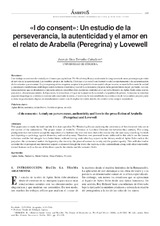Mostrar el registro sencillo del ítem
"I do consent": un estudio de la perseverancia, la autenticidad y el amor en el relato de Arabella (Peregrina) y Lovewell
| dc.contributor.author | Torralbo Caballero, Juan de Dios | |
| dc.date.accessioned | 2014-10-31T11:59:34Z | |
| dc.date.available | 2014-10-31T11:59:34Z | |
| dc.date.issued | 2014 | |
| dc.identifier.issn | 1575-2100 | |
| dc.identifier.issn | 2386-4494 | |
| dc.identifier.uri | http://hdl.handle.net/10396/12426 | |
| dc.description.abstract | Este trabajo se centra en la verdad y en el amor que capitalizan The Wandering Beauty analizando la congruencia de unos personajes que están al servicio de la autenticidad. Los nombres propios de Arabella, Christian o Lovewell son ilustrativos del comportamiento y la caracterización de los actantes que encarnan. La joven protagonista no quiere aceptar la imposición de un marido al que no ama; se marcha buscando la verdad y encarnando también una simbología contra la tiranía doméstica y social. La constancia y la justa lucha por un futuro mejor, por tanto, son dos temas perennes que se abordan en el presente artículo sin orillar otras cuestiones centrales en el universo literario de Aphra Behn como son los prejuicios, el asunto pecuniario, la hipocresía, la sinceridad, el lugar de la mujer en la sociedad y la igualdad de género. Asimismo se estudian aspectos tropológicos y retóricos evidenciados mediante la ironía, el realismo, la verosimilitud o la construcción de los nombres propios junto a otros rasgos textuales dignos de ahondamiento cuales son el empleo del estilo directo, los símiles o los campos semánticos. | es_ES |
| dc.description.abstract | This paper aims to study the truth and the love that capitalize The Wandering Beauty analyzing the consistency of the characters who are at the service of the authenticity. The proper names of Arabella, Christian or Lovelace illustrate the behavior they embody. The young protagonist does not want to accept the imposition of a husband she does not love; that is the reason why she runs away searching for truth and depicting a symbology against domesticy and social tyranny. Therefore, two perennial issues addressed in this article are the human coherence and the fair struggle for a better future, without leaving aside other key aspects in the literary world of Aphra Behn such as the prejudice, the economical matter, the hypocrisy, the sincerity, the place of women in society and the gender equality. This will also lead to consider the tropological and rhetorical aspects evidenced through the irony, the realism, or the verisimilitude along with other noteworthy textual features such as the use of the direct speech, the símiles and the semantic fields. | es_ES |
| dc.format.mimetype | application/pdf | es_ES |
| dc.language.iso | spa | es_ES |
| dc.publisher | Asociación de Estudios de Ciencias Sociales y Humanidades | es_ES |
| dc.rights | https://creativecommons.org/licenses/by-nc-nd/4.0/ | es_ES |
| dc.source | Ámbitos (31), 105 - 112 (2014) | es_ES |
| dc.subject | Aphra Behn | es_ES |
| dc.subject | Narrativa | es_ES |
| dc.subject | Relato breve | es_ES |
| dc.subject | Ficción en prosa | es_ES |
| dc.subject | Novella | es_ES |
| dc.subject | Narrative | es_ES |
| dc.subject | Short Fiction | es_ES |
| dc.subject | Prose Fiction | es_ES |
| dc.title | "I do consent": un estudio de la perseverancia, la autenticidad y el amor en el relato de Arabella (Peregrina) y Lovewell | es_ES |
| dc.type | info:eu-repo/semantics/article | es_ES |
| dc.rights.accessRights | info:eu-repo/semantics/openAccess | es_ES |

